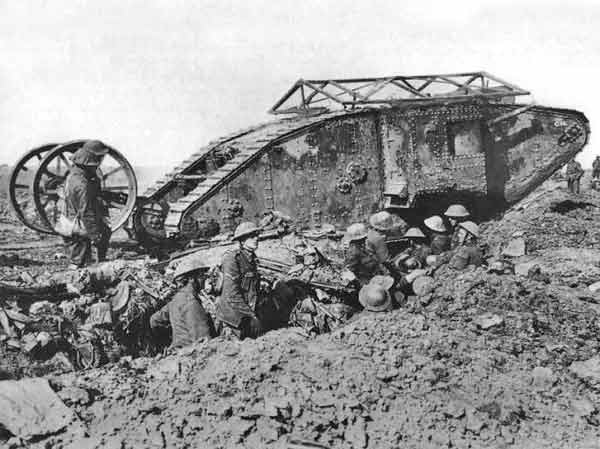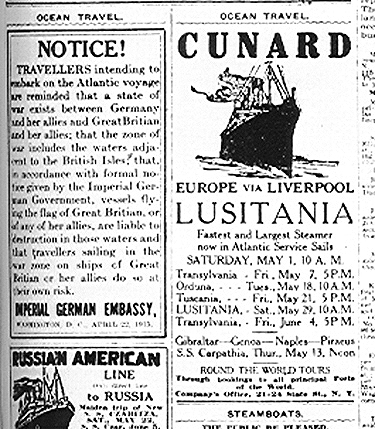
This month is the 100 year anniversary of the “war to end all wars,” retroactively labeled World War One. Nine million died before it was over, and its conclusion almost guaranteed there would be a sequel.
Many, many factors led to the crisis that was sparked by the assassination of Austrian Archduke Franz Ferdinand, A major catalyst was Tsarist Russia’s desire for Constantinople (and warm water ports), owned by their traditional enemy, the Ottoman Empire. Bismark’s intricate cobweb of fragile alliances began to break down once he was no longer around to maintain it. And when the Second Reich’s navy grew close to 2/3rds the size of the Royal Navy, Great Britain became hostile toward Germany and formed an alliance with her traditional enemies, France and Russia. The polyglot empire of Austria-Hungary had very pigheaded, hamfisted leadership in handling the aftermath of the assassination, and unfortunately Kaiser Wilhelm gave them carte blanch to resolve the crisis.

When the Great War began, Field Marshal Helmuth Von Moltke (the Younger–nowhere near the caliber of commander his uncle had been) tampered with the Von Schlieffen Plan at the last minute, weakening the German right wing. Spirited resistance from the Belgians slowed that weakened right wing down, buying the British and French valuable time to deploy their forces. Then tactical Blunders by German commanders, and decisive action by their French counterparts, stalled the German advance short of Paris.
Both sides raced to the sea in an effort to outflank each other, and soon a stalemate ensued that would last for most of the war. Trenches were dug and, though outnumbered, the Germans proved a match for their combined enemies on the Western Front.

Gas warfare was introduced in the trench war, by the Germans…as well as flamethrowers for breaching bunkers. Tanks were introduced by the British. Their invention was mothered by the need for an “armor plated trench-crosser” and the name for the armored monstrosities (“tanks”) came from a disinformation ploy in order to keep the weapon secret.
During the Great War, battle spread even into the sky. Aircraft transitioned from infancy to toddler-hood. What were flimsy, unreliable contraptions in 1914, used primarily for observation, by war’s end had evolved into fighters and bombers.
The reason German strategists violated Belgium’s neutrality had to do with timing, and concern over the alleged heavy hitter in the Triple Entente: Russia. Then, as later, Russia’s manpower gave her a tremendous numerical advantage over any other army in Europe. The German High Command decided they had to deliver a quick, decisive knockout blow in the West so they could turn to meet the “Great Steamroller From the East.” So they banked on the same Von Schlieffen Plan the Prussians used to capture Paris and force France’s surrender in 1871, which meant sweeping through Belgium. As noted above, however, reshuffling of divisions weakened the most crucial component of the Plan in 1914.

Ironically, the knockout blow came in the East. With comparatively small German forces, Hindenburg and Ludendorff humiliated the Russian juggernaut. Austria-Hungary, which touched off this epic powderkeg to begin with, proved worthless militarily. They were barely competent enough to handle Serbia and turncoat Italy (originally part of the Triple Alliance), much less Russia. So the Germans were stuck fighting on both fronts.
 Enter globalist puppet Woodrow Wilson, who saw this epic crisis as an opportunity to bring about a League of Nations–the first overt attempt in modern history to establish world government. After campaigning in 1916 on the slogan “He kept us out of war!” (as if there were any reason to entangle the USA in that European conflict) he stepped up his efforts to get us into war.
Enter globalist puppet Woodrow Wilson, who saw this epic crisis as an opportunity to bring about a League of Nations–the first overt attempt in modern history to establish world government. After campaigning in 1916 on the slogan “He kept us out of war!” (as if there were any reason to entangle the USA in that European conflict) he stepped up his efforts to get us into war.
Armchair historians will be quick to cite the sinking of the Lusitania. The Wilson administration was giving weapons and war material to the British, who were at war with Germany. One shipment was being smuggled over the Atlantic on the famous passenger liner (this has been confirmed repeatedly during the following century, though coincidence theorists still deny it). The Germans posted a warning in American newspapers that nobody should book passage on a ship flying the flag of a warring nation sailing into a war zone.
 Duh.
Duh.
Were the powers-that-were incredibly foolish, or were they much like the Hamas cowards in Gaza, hiding behind women and children as they fire rockets at Israeli civilians, knowing that any meaningful reprisal will make their enemy look villainous to the world?
Question: would the US Navy have hesitated to sink any vessel from a “neutral” country shipping war material to the Japanese from 1942-45? Absolutely not–that’s back when we fought wars to win.
The Germans did suspend submarine attacks against Wilson’s “neutral” arms trafficking precisely because of the public relations trap. They resumed unrestricted submarine warfare out of national desperation, partly because their population was starving due to the British Navy’s blockade, and they clutched at any straw which might cause the Anglo-French to sue for peace.

After mass desertions in the Russian army and the subsequent Bolshevik Revolution, Russia (the primary instigator of 1914, next to Austria-Hungary) bowed out of the war. This freed up German divisions from the Eastern Front, which shipped West and began to push the French and British back.
But it was too late. By now the USA was overtly involved and fresh American troops were moving up to the lines. Doughboys forced the pendulum to swing the other way.
The Second Reich now realized victory was no longer possible and agreed to an armistice.
The United States Congress was gullible enough to get suckered into World War I, but they weren’t gullible enough to get suckered into the League of Nations.
Wilson, the globalist stooge, had failed.
But the failure was only temporary. The terms of the Versailles Treaty ensured there would be another world war, even worse than the first.
In the aftermath of that war the renewed effort at world government would result in the United Nations. This time Congress would not only entangle America, but arrange so that most of its funding came from the wallets of American taxpayers; most of the cannon fodder for its “police actions” would come from American families; yet the leadership of the world body would always be Communist or Socialist.
Since the formation of the UN–ostensibly created to usher in world peace–there have been more wars around the globe than ever before.
A common fallacy concerning the world wars purports that American “isolationism” made the planet a more dangerous place. Quite the opposite is true. Interventionism paved the way for a sevenfold increase of the horror unleashed on the planet from 1914-18. Had our politicians done what they are hired to do, and genuinely kept us out of that insanity, the Great Powers would have had to sort it out from a more equitable standpoint and it is highly unlikely there would have been a travesty like the Versailles system to turn Germany into a breeding ground for Hitler, or someone like him.
